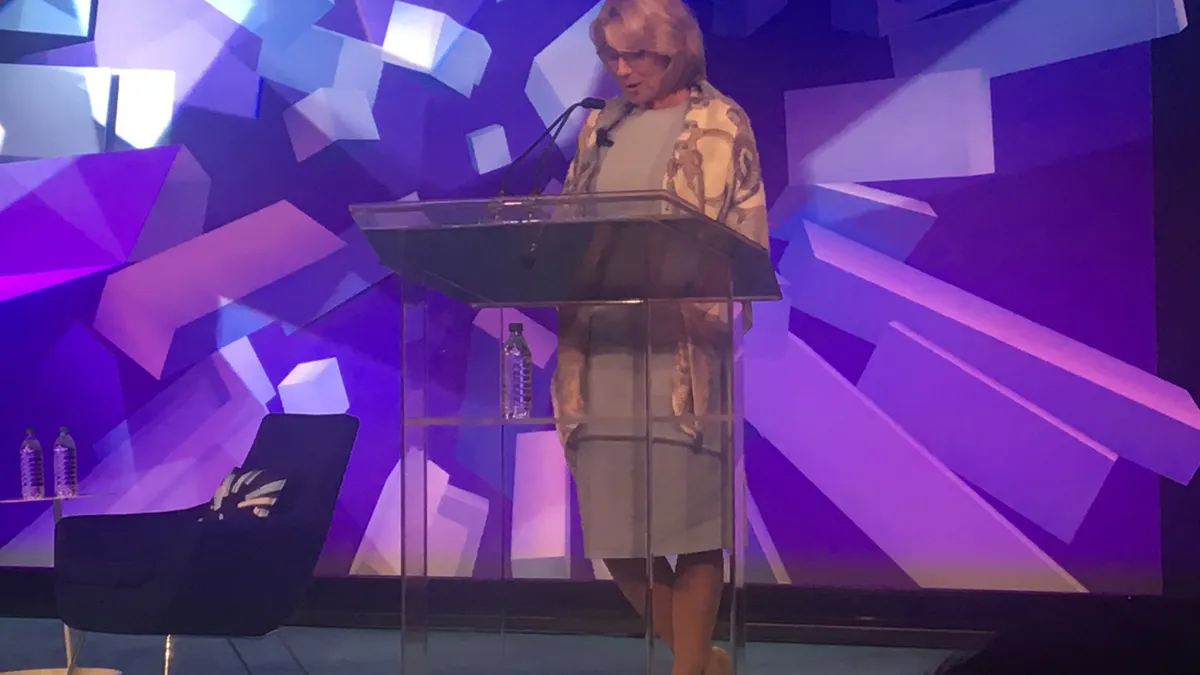Dive Brief:
- In a Tuesday afternoon keynote address and fireside chat at the annual ASU+GSV Summit in Salt Lake City, U.S. Secretary of Education Betsy DeVos reiterated her reform and school choice agenda, saying that the facts show the current education system is antiquated, unjust and fails to serve students.
- During the keynote, DeVos said that the existing K-12 public education system is flawed because it is based on an outdated Prussian education model (which she noted was no longer a country), it assigns students to schools based on the street their family lives on, and students have continually fallen behind peer nations globally in the PISA test.
- When asked about Higher Education Act reauthorization during the fireside chat, which was moderated by Center for Education Reform Founder and CEO Jeanne Allen, DeVos asked why they should reauthorize a 50 year old system rather than starting from scratch, noting that the needs of students and individuals should be the focus, rather than "systems" and "buildings" in both higher ed and K-12.
Dive Insight:
While there was little in DeVos' talking points that wasn't already known, the biggest surprise from the session may very well have been the suggestion that the Higher Ed Act should be scrapped and replaced rather than tweaked and reauthorized as it has been in the past. Indeed, there could be an argument for scrapping it, given ongoing debate around accreditation reform, new models that facilitate lifelong learning based on skills, programs that "unbundle" existing programs as a result of those micro-credential or skill-based demands, and so on. These factors were assumed to be addressed in a reauthorization, but could these issues justify an entirely new law to replace the HEA?
On the critiques of the existing K-12 system, the notion that it is antiquated because it was based on a system from a country that no longer exists seems odd when placed in the context of other systems pioneered by countries that no longer exist, such as democracy and Rome. Still, her argument against the idea that students be placed in schools based on the street their family lives on, especially when a student lives in an underserved area, has merit. Schools in some locales have fewer resources than others, and in many cases, this is due at least in part to funding systems based on property taxes. While choice could potentially open the door to more opportunities for these students, there are still underlying issues related to poverty that must be addressed. In increasingly digital classrooms, do they have internet access at home? Is it feasible for parents to easily transport their children to the school of their choosing? Will such issues as food insecurity hinder their learning even at a better school?
And while U.S. PISA scores have remained unimpressive, it's worth considering whether measuring students based on their ability to succeed on a standardized test, which is largely dependent upon rote memorization, is really the best approach.
On an individual state level, Massachusetts performs much more competitively with peer nations on international tests, so perhaps the nation at large would be best served if Massachusetts' best practices were adopted by other states. This would, of course, have to be done in the context of individual issues on a state-by-state basis, because, as DeVos noted in one of her best points, no two states are the same. Largely rural Midwestern states face entirely different challenges and issues than many New England states, for example.
With ESSA giving states more authority in education decisions, it will be interesting to see how approaches to that sort of thing are taken — and how heavy a hand DeVos is willing or able to take under that law as education secretary, given her insistence that the notion that the federal government should mandate anything from the top is a “fallacious” approach. And also, in the context of her statement that, during all of her schools visits, teachers and administrators have told her how "burdensome" existing federal regulations are.














